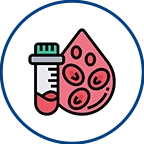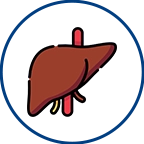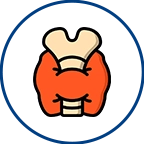How does Calcium Deficiency affect Bone Health

Our bones are dynamic structures that require a balanced diet and a continuous supply of nutrients to maintain their health and strength. Among these essential nutrients, calcium and vitamin D play pivotal roles. Calcium is not only essential for building and maintaining strong bones and teeth but is also crucial for blood circulation and muscle control. Vitamin D, on the other hand, is necessary for effective calcium absorption from our diet. Since our bodies cannot produce calcium, it must be obtained from the foods we consume.
When our calcium intake is insufficient to support bodily functions, our bodies tap into stored calcium within our bones. This depletion weakens our bones over time, increasing the risk of osteoporosis, a condition characterized by brittle bones. It can also lead to related conditions such as osteopenia and hypocalcaemia.
Insufficient calcium intake during childhood can even hinder optimal growth. Hence, adhering to recommended daily calcium intake through various sources becomes crucial.
Home Sample Collection
Why is Calcium Important?
Calcium is primarily known for its role in bone health. Approximately 99% of the body's calcium is concentrated in bones and teeth, contributing to their strength and hardness. The remaining percentage is involved in vital bodily functions, including muscle contractions, nerve transmission, and blood vessel regulation.
Our bones undergo continuous remodeling, with calcium entering and exiting daily. During childhood and adolescence, the body replaces lost bone more rapidly than it degrades, leading to an increase in bone mass. However, this process evens out around the age of 30. In later years, especially for post-menopausal women, bone breakdown outpaces new bone formation, potentially resulting in osteoporosis.
Recommended Daily Calcium Intake
The daily recommended calcium intake varies by age group. For adults, the daily suggested intake is around 1000 mg, increasing to 1200 mg for those aged 71 and above. Pregnant and breastfeeding adults are also advised to aim for 1000 mg daily.
Consequences of Calcium Deficiency
Calcium deficiency, also known as hypocalcaemia, occurs when the blood's calcium levels drop. This can contribute to osteoporosis, brain alterations, cataracts, and dental changes.
Factors Leading to Calcium Deficiency
Several factors can cause calcium deficiency:
Poor long-term calcium intake.
Intolerance to calcium-rich foods.
Genetic factors.
Medications impacting calcium absorption.
Hormonal changes, such as postmenopausal or post-hysterectomy situations.
Symptoms of Calcium Deficiency
Early signs of calcium deficiency might not be immediately noticeable. Over time, it can lead to low bone density, eventually resulting in brittle bones and osteoporosis. Severe symptoms include muscle spasms, muscle cramps, easy bone fractures, memory loss, confusion, numbness or tingling in extremities, hallucinations, brittle nails, and depression.
Enhancing Bone Health
To fortify your bone health and increase calcium intake, consider the following:
Adhere to recommended dietary allowances (RDAs) for calcium.
Consume calcium-rich foods like dairy, fortified plant-based milk, leafy greens, nuts, seeds, and fish.
Ensure an adequate intake of protein, magnesium, vitamin D, vitamin K2, and phosphorus for comprehensive bone health.
Engage in regular physical activity to support bone strength.
Quit smoking, as nicotine affects calcium absorption.
Limit alcohol intake, as it impacts vitamin D levels and increases the risk of falls.
By understanding the essential role of calcium and vitamin D in bone health and making conscious dietary and lifestyle choices, you pave the way for a stronger, more resilient skeletal system that enhances your overall well-being.
Frequently Asked Questions
How do calcium and vitamin D contribute to bone health?
Calcium is essential for bone structure, while vitamin D aids calcium absorption, ensuring strong bones.
Can bones be affected if calcium intake is inadequate?
Yes, insufficient calcium can lead to weakened bones and increase the risk of conditions like osteoporosis.
What are signs of calcium deficiency?
Symptoms may include muscle cramps, brittle nails, dental issues, and in the long term, osteoporosis.
How does the body compensate for low calcium intake?
The body takes calcium from bones to maintain vital functions, gradually weakening bones over time.
What role does vitamin D play in bone health?
Vitamin D regulates calcium levels, facilitates bone mineralization, and supports overall bone health.
What can cause calcium deficiency?
Poor intake, dietary intolerances, genetic factors, certain medications, and hormonal changes can lead to deficiency.
Can calcium deficiency affect growth in children?
Yes, inadequate calcium intake during childhood can impact growth potential.
Can a balanced diet fulfill calcium needs?
Yes, incorporating calcium-rich foods like dairy, leafy greens, nuts, seeds, and fortified foods can meet calcium requirements.
Is calcium solely responsible for bone health?
Other nutrients like protein, magnesium, vitamin K2, and phosphorus also contribute to optimal bone health.
Can calcium deficiency lead to osteoporosis?
Yes, prolonged deficiency weakens bones, increasing the risk of osteoporosis, characterized by brittle bones.
Book Appointment
Our Locations Near You in Hyderabad
3KM from Banjara Hills
1.9KM from Yusufguda
3KM from Madhura Nagar
5KM from Shaikpet




